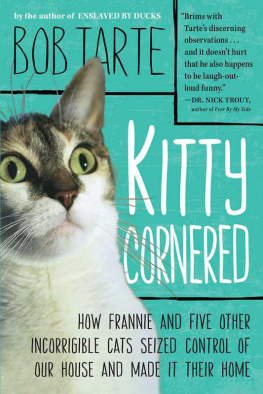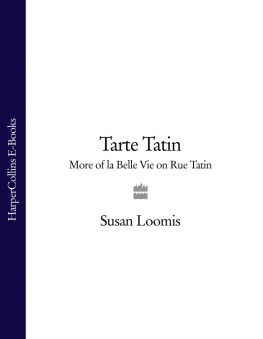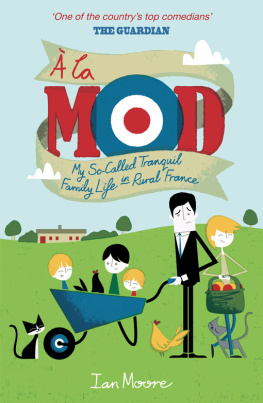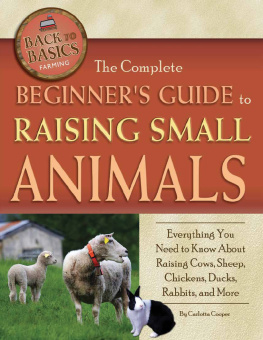E NSLAVED BY D UCKS
by BOB TARTE
Algonquin Books of Chapel Hill

To my wonderful wife, Linda, who somehow keeps the chaos at bay.
Contents
Cast of Characters
(Listed more or less in order of appearance and by type)
INDOOR ANIMALS
Bunnies
Binky: stubborn dwarf Dutch troublemaker
Bertha: feral Netherland dwarf, captured in suburbia
Bertie: Netherland dwarf, brother to Rollo
Rollo: Netherland dwarf, brother to Bertie
Walter: large-headed Checker Giant, rescued from barn
Parrots
Ollie: ill-tempered brotogeris pocket parrot
Stanley Sue: gender-switching African grey Timneh
Dusty: chatty, author-biting Congo African grey
Other Birds
Howard: amorous ring-neck dove
Chester: non-hand-tamed canary
Elliott: feisty canary, successor to Chester
Farley: parakeet senior citizen
Rossy: Ollies female parakeet suitor
Reggie: Howards male parakeet suitor
Sophie: demure female parakeet
Tillie: visiting dove
Weaver: special guest starling
Cats
Penny: grey reclusive female, intended as Binkys friend
Agnes: bold outdoorswoman, discovered under bird feeder
OUTDOOR ANIMALS
Ducks
Daphne: Muscovy from auto-parts parking lot
Phoebe: black-and-white Cayuga, smitten by wanderlust
Martha: Blue Swede with ear-splitting voice
Peggy: heroic call duck, protector of Chloe
Chloe: mallard who learned to limp
Blabby and Wing Ding: smelly call-duck delinquents
Stewart: Khaki Campbell, brother to Trevor
Trevor: Khaki Campbell, brother to Stewart
Marybelle, Clara, and Gwelda: unexpected mixed-duck offspring
Hector: cantankerous, shoulder-sitting Muscovy
Richie: Richmond Pond foundling
Timmy: unexpected son of Richie
Geese
Liza: lap-sitting African goose, sister to Hailey
Hailey: slightly less-friendly goose, sister to Liza
Turkeys
Hazel: victim of sneak attack
Lizzie: presumed perpetrator of sneak attack
And two that remain nameless
ORDINARY HUMANS
Bob Tarte: put-upon author
Linda Tarte: long-suffering wife to unfortunate author
Joan Smith: sister to victimized author
Rupert Murdoch: nonbillionaire duck breeder
Jacob Lestermeyer: operator of petting zoo/meat market
LuAnne Grady: owner of indoor orphan Green-Winged Teal
Bill Holm: mocking yuppie friend of pathetic author
Marge and George Chedrick: DNR-affiliated animal rehabbers
LETTERED HUMANS
Alanson Benedict, DVM: So youve been bad-mouthing our practice.
Katherine Stallings, DVM: prescriber of questionable ointments
Michael Hedley, DVM: amiable zoo-consultant genius
Alice Colby, DVM: doesnt do turkeys
Owen Fuller, DVM: avian expert extraordinaire
John Carlotti, DVM: made Howard a collar
Carl Glaser, MD: Do you hear voices?
Jerold Rick, MD: heartless hippie shrink
Introduction
I SHOULD HAVE KNOWN I was doomed to write a book about our animals. Since they had taken over just about everything else in my life, it was only a matter of time before they commandeered my word processor, too. This began to seem inevitable when I was working on a music column for The Beat magazine about a vocal group from Sardinia, and my editor CC Smith asked me, Are there any animals in it?
No, of course not, I protested.
No parrots or rabbits?
Not even a sardine.
Well, thats a first. Every column this year has had a goose in it or something.
Not this one, I answered defensively, though I had very nearly written about a goose, but a pang of conscience had stopped me.
Though not quite as frequently as my editor had claimed, animal anecdotes had steadily gnawed their way into my music column over the years. I never could figure out why she allowed them to inhabit a magazine devoted to reggae and international music. I suppose they added texture to The Beat, like sand clinging to a strawberry. And they certainly made the other writers look even more expert by comparison.
I had started contributing to The Beat back in 1989, when record stores still sold records. When I bought my first CD player, I was seized by a rare fit of extroversion and penned a letter to the magazine suggesting that someone cover the scant few reggae, African-music, and world-music albums then available on CD. My letterhead made the bold claim that I was a writer. I had little experience with magazines, except for an article on strange coincidences involving clowns and the number 22 that I had written several years earlier with a friend for a British paranormal magazine. But CC liked what I had sent her and christened my CD-review column Technobeat, never suspecting that this would one day become the name for a type of computer-generated dance musicand never dreaming that I would one day hand in a story about chasing runaway ducks.
My main difficulty with my new column was a profound ignorance of the international music I was supposed to be an authority on. But I figured that as long as I concentrated on obscure genres like Tuvan throat-singing or Finnish Karelian runo songs, most readers of The Beat probably wouldnt catch on that I didnt know any more than they did. To help discourage informed readers who might expose me, I began leading off my column with an obfuscating essay on a nonmusical subjecttypically one that presented me in an unflattering light. A ready subject was my jarring change of address to a rural setting after thirty-eight years of urban life.
One column described how, just after I had moved from an apartment in downtown Grand Rapids, Michigan, to a one-hundred-year-old farmhouse, I was tortured by a sign outside GoFers restaurant up the road that apparently proclaimed CONGRATULATIONS BOB TARTE . This troubled me. Who knew I had bought a house? Who should care? When I pulled into GoFers parking lot to get a closer look, I discovered that the sign actually read, CONGRATULATIONS BOB & TATE . But why the strange confluence of names the week of my arrival? What person is first-named Tate? And why was fate snickering at me?
I wrote about my wife, Linda, our vacations to oddball places like Wawa, Ontario, and, increasingly, the animals that started invading our lives. The topic of pets became hard to avoid. One evening I was reviewing a CD by Foday Musa Suso, a musician from Senegal playing the West African kora harp. Our rabbit, Binky, had been roaming the living room in search of electrical cords to chew when I fired up the stereo, and the plucked strings of the kora unnerved him. He hid behind an overstuffed chair, loudly thumping a hind foot against the floor until I finally turned off the CD.
Subsequent animals cut deeper into my listening hours. Noisy parrotswho were themselves inexplicably sensitive to noiseprotested if I played music in the evening while they were soaking up their beauty sleep. Animal concerns eventually restricted daytime listening, too. I needed to keep my ears open for signs of mischief from woodwork-destroying parakeets, or for quacks of distress from an outdoor duck that had fallen afoul of its flock.







